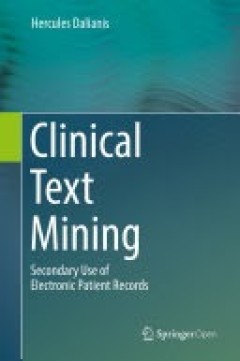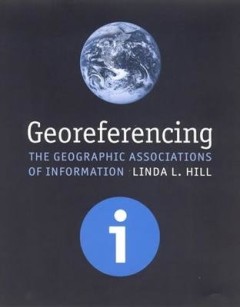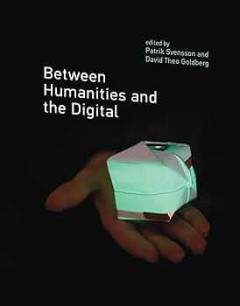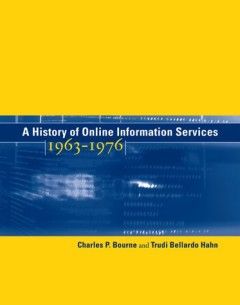Filter by

Clinical Text Mining : Secondary Use of Electronic Patient Records
This open access book describes the results of natural language processing and machine learning methods applied to clinical text from electronic patient records. It is divided into twelve chapters. Chapters 1-4 discuss the history and background of the original paper-based patient records, their purpose, and how they are written and structured. These initial chapters do not require any tec…
- Edition
- -
- ISBN/ISSN
- 9783319785035
- Collation
- -
- Series Title
- -
- Call Number
- -

Theological Libraries and Library Associations in Europe = A Festschrift on t…
During the past 50 years, theological libraries have confronted secularisation and religious pluralism, along with revolutionary technological developments that brought not only significant challenges but also unexpected opportunities to adopt new instruments for the transfer of knowledge through the automation and computerisation of libraries. This book shows how European theological libraries…
- Edition
- -
- ISBN/ISSN
- 9789004523197
- Collation
- 500 hlm,: ill, lamp; 21 cm
- Series Title
- -
- Call Number
- -

Insights into the New Hydrogen Economy
This open access book offers a comprehensive exploration of the future of the hydrogen industry. It builds upon insights gathered from a series of expert workshops and follow-on activity. International experts from various fields, including industry, public policy, and academia, engaged in dialogue and knowledge exchange, resulting in invaluable findings and observations. This book builds upon…
- Edition
- 1
- ISBN/ISSN
- 9783031718335
- Collation
- XXIX, 162 hlm; ill., lamp.,
- Series Title
- -
- Call Number
- -

Core Concepts and Methods in Load Forecasting: With Applications in Distribut…
This comprehensive open access book enables readers to discover the essential techniques for load forecasting in electricity networks, particularly for active distribution networks. From statistical methods to deep learning and probabilistic approaches, the book covers a wide range of techniques and includes real-world applications and a worked examples using actual electricity data (includi…
- Edition
- 1
- ISBN/ISSN
- 978-3-031-27852-5
- Collation
- XV, 331
- Series Title
- -
- Call Number
- -

New Horizons for a Data-Driven Economy
In this book readers will find technological discussions on the existing and emerging technologies across the different stages of the big data value chain. They will learn about legal aspects of big data, the social impact, and about education needs and requirements. And they will discover the business perspective and how big data technology can be exploited to deliver value within different se…
- Edition
- 1
- ISBN/ISSN
- 978-3-319-21569-3
- Collation
- -
- Series Title
- XX, 303
- Call Number
- -

3D Research Challenges in Cultural Heritage III: Complexity and Quality in Di…
This open access book presents a collection of papers focusing on current 3D research challenges in the domain of digital cultural heritage. 3D technologies find considerable use within the field of cultural heritage at the beginning of the 21st century, for example in the areas of data acquisition, modeling, archiving in local repositories, harvesting in digital libraries and their long-term p…
- Edition
- 1
- ISBN/ISSN
- 9783031355936
- Collation
- VIII, 157
- Series Title
- -
- Call Number
- -

Mobile Forensics – The File Format Handbook
This open access book summarizes knowledge about several file systems and file formats commonly used in mobile devices. In addition to the fundamental description of the formats, there are hints about the forensic value of possible artefacts, along with an outline of tools that can decode the relevant data. The book is organized into two distinct parts: Part I describes several differen…
- Edition
- 1
- ISBN/ISSN
- 978-3-030-98467-0
- Collation
- -
- Series Title
- -
- Call Number
- XIII, 269

Georeferencing : the geographic associations of information
An introduction to the principles of unified georeferencing, which uses placename and geospatial referencing interchangeably across all types of information storage and retrieval systems.OCLC-licensed vendor bibliographic record.
- Edition
- -
- ISBN/ISSN
- 026208354X
- Collation
- 1 online resource (xiii, 260 pages) : illustrations, maps.
- Series Title
- Digital Libraries and Electronic Publishing
- Call Number
- 005 HIL g

Between Humanities and the Digital
"Like most academic discourses, the Digital Humanities are a conversation in flux. Some would argue that the Digital Humanities are already a well-established field, pointing to the 20-year history of Humanities Computing. Others (me) see a new breed of academic with skills in both technology and the traditional humanities (the Platform Studies and Software Studies series), while others might i…
- Edition
- -
- ISBN/ISSN
- 9780262328364
- Collation
- 1 online resource (xii, 574 pages) :illustrations
- Series Title
- -
- Call Number
- -

A history of online information services, 1963-1976
Every field of history has a basic need for a detailed chronology of what happened: who did what when. In the absence of such a resource, fanciful accounts flourish. This book provides a rich narrative of the early development of online information retrieval systems and services, from 1963 to 1976--a period important to anyone who uses a search engine, online catalog, or large database. Drawing…
- Edition
- -
- ISBN/ISSN
- 9780262269049
- Collation
- 1 online resource (xvi, 493 pages) : illustrations
- Series Title
- -
- Call Number
- 005 BOU h
 Computer Science, Information & General Works
Computer Science, Information & General Works  Philosophy & Psychology
Philosophy & Psychology  Religion
Religion  Social Sciences
Social Sciences  Language
Language  Pure Science
Pure Science  Applied Sciences
Applied Sciences  Art & Recreation
Art & Recreation  Literature
Literature  History & Geography
History & Geography